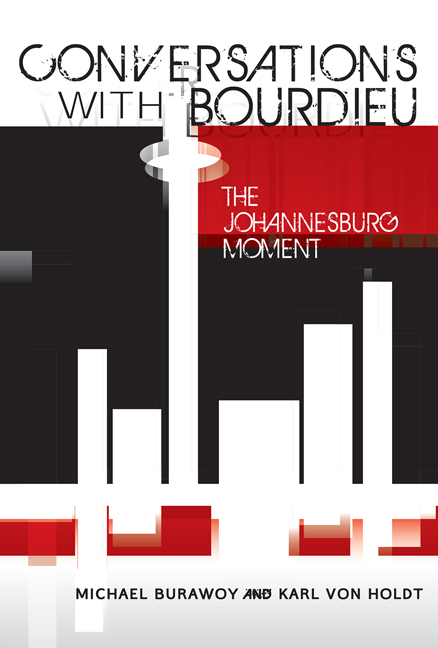Book contents
- Frontmatter
- Contents
- Abbreviations and acronyms
- Preface
- Prologue The Johannesburg Moment
- Acknowledgements
- CONVERSATION 1 SOCIOLOGY AS A COMBAT SPORT
- CONVERSATION 2 Theory and Practice
- CONVERSATION 3 CULTURAL DOMINATION
- CONVERSATION 4 COLONIALISM AND REVOLUTION
- CONVERSATION 5 PEDAGOGY OF THE OPPRESSED
- CONVERSATION 6 THE ANTINOMIES OF FEMINISM
- CONVERSATION 7 INTELLECTUALS AND THEIR PUBLICS
- Mills Meets Bourdieu
- The Symbolic World of Politics
- CONVERSATION 8 MANUFACTURING DISSENT
- Epilogue Travelling Theory
- Bibliography
- Index
Mills Meets Bourdieu
from CONVERSATION 7 - INTELLECTUALS AND THEIR PUBLICS
Published online by Cambridge University Press: 20 April 2018
- Frontmatter
- Contents
- Abbreviations and acronyms
- Preface
- Prologue The Johannesburg Moment
- Acknowledgements
- CONVERSATION 1 SOCIOLOGY AS A COMBAT SPORT
- CONVERSATION 2 Theory and Practice
- CONVERSATION 3 CULTURAL DOMINATION
- CONVERSATION 4 COLONIALISM AND REVOLUTION
- CONVERSATION 5 PEDAGOGY OF THE OPPRESSED
- CONVERSATION 6 THE ANTINOMIES OF FEMINISM
- CONVERSATION 7 INTELLECTUALS AND THEIR PUBLICS
- Mills Meets Bourdieu
- The Symbolic World of Politics
- CONVERSATION 8 MANUFACTURING DISSENT
- Epilogue Travelling Theory
- Bibliography
- Index
Summary
It is the political task of the social scientist – as of any liberal educator – continually to translate personal troubles into public issues, and public issues into the terms of their human meaning for a variety of individuals. It is his task to display in his work – and, as an educator, in his life as well – this kind of sociological imagination.
Mills (1959: 187)Political competence, inasmuch as there can be a universal definition of it, undoubtedly consists in the ability to speak in universal terms about particular problems – how to survive dismissal or redundancy, an injustice or an accident at work, not as individual accident, a personal mishap, but as something collective, common to a class. This universalization is possible only by way of language, by access to a general discourse on the social world. This is why politics is in part bound up with language. And here again, if you like, we can introduce a bit of utopia to attenuate the sadness of sociological discourse, and convince ourselves that it is not too naive to believe that it can be useful to fight over words, over their honesty and proper sense, to be outspoken and to speak out.
Bourdieu (2008 [1977]: 76–77)All this means that the ethno-sociologist is a kind of organic intellectual of humanity, and as a collective agent, can contribute to de-naturalizing and de-fatalizing human existence by placing his skill at the service of a universalism rooted in the comprehension of different particularisms.
Bourdieu (2008 [2000]: 24)So far, I have created imaginary conversations between Bourdieu and Marxism: how Bourdieu appropriated so much of Marx, but took it in a direction unimagined by Marx, namely the political economy of symbolic goods; how in many ways Gramsci and Bourdieu are at loggerheads over the sources of the durability and depth of domination; how, despite their common views of colonialism, Bourdieu and Fanon clash over the means of its transcendence; and, finally, how Bourdieu's understanding of masculine domination as symbolic power was a pale replica of Beauvoir's feminism. We turn now to another conversation, between Bourdieu and Mills. Both deeply ambivalent about Marxism, they shared similar sociological and political projects, despite living half a century apart and on different continents.
- Type
- Chapter
- Information
- Conversations with BourdieuThe Johannesburg Moment, pp. 151 - 168Publisher: Wits University PressPrint publication year: 2012

